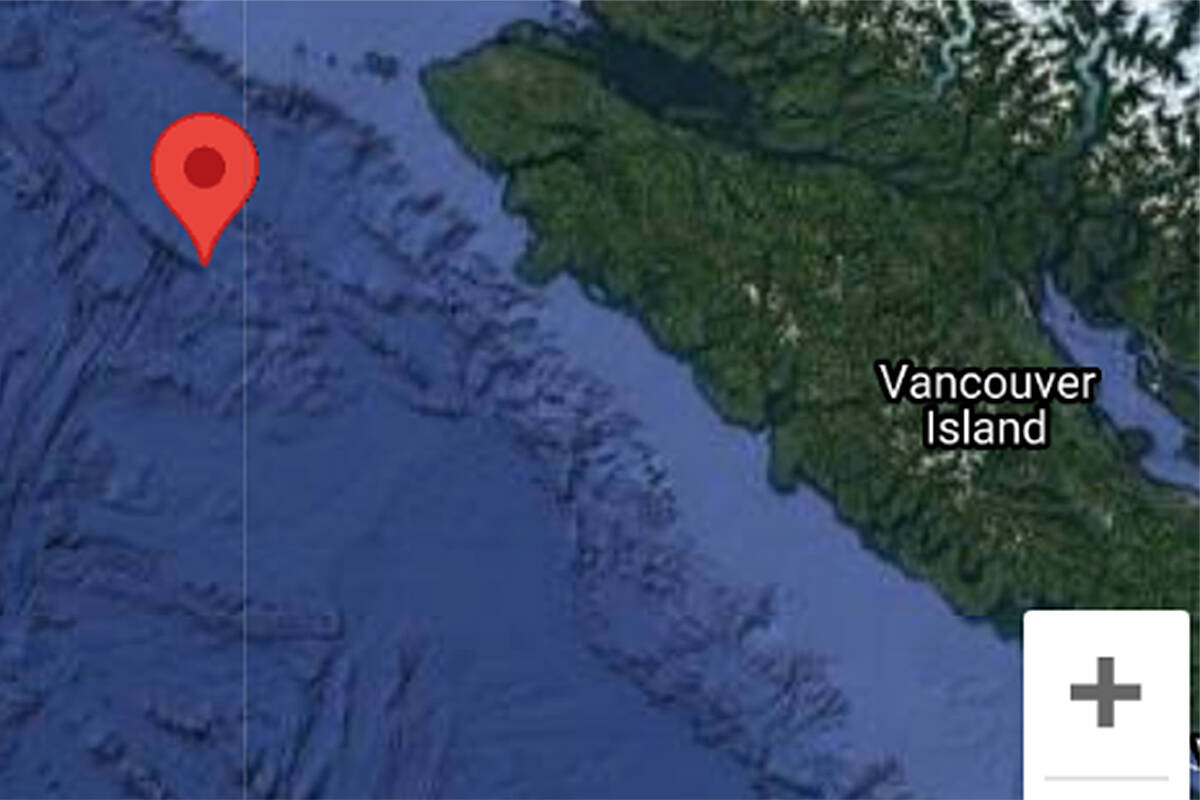The first earthquake this year with a magnitude higher than 4.0 was recorded off the coast of Vancouver Island on Jan. 2.
The 4.7 magnitude quake, which would have gone unnoticed by people living on the Island, happened 156 kilometres off the coast, near Port Alice.
#Canada’s first M4+ earthquake of 2022.
M4.7, at 5:10 a.m. PT, January 2
No damage/impacts, not reported felt.
Earthquake in this offshore area are common, with more than 120 M4.7 or larger earthquakes during the past 30 years. Why? Active plate tectonics:https://t.co/wlgp9sbQbN pic.twitter.com/X0WLslkc9u— John Cassidy (@earthquakeguy) January 2, 2022
The event was caused offshore by active plate tectonics, according to John Cassidy, an earthquake seismologist with Natural Resources Canada. The tectonic plates have moved continuously over millions of years, at speeds of around three to five centimetres per year, “which is approximately how fast fingernails grow,” he added.
Such movements generally cause smaller earthquakes, he said, noting that more than 100 earthquakes with magnitudes of zero or larger were recorded within a 100-kilometre radius of the Jan. 2 quake.
READ MORE: Vancouver Island slides west, tremors could signal tectonic shifting
Plate movement can also cause larger seismic events in the same offshore region, such as the 6.8-magnitude earthquake recorded between Haida Gwaii and northern Vancouver Island in April 1992, Cassidy said.
The biggest earthquakes happen along subduction faults when plates collide, Cassidy said. He described the other two types of offshore faults as spreading ridges, which sees plates move apart; and transform faults, where tectonic plates slide past one another.
The nearest subduction fault to Greater Victoria extends from northern California to northern Vancouver Island. The earthquakes they can cause occur hundreds of years apart – the last struck in 1700, according to written records of a tsunami that hit Japan at the time and corroborated by Indigenous oral story telling.
“Our offshore subduction fault is currently locked, with no movement, and likely has been since the last M9 on Jan. 26, 1700,” Cassidy said.
ALSO READ: The day the Island shook: Vancouver Island rocked by earthquake 75 years ago today
Predicting when the next “big one” will happen is hard, he added.
Nineteen magnitude 9 earthquakes have happened in the past 10,000 years, with the expected time frame for the next one to happen anywhere from 250 to 850 years from 1700. So it could happen today, or in 2500 or beyond. But the data researchers are working with have has improved greatly in the past couple of years, Cassidy said, and researchers have learned from past earthquakes and similar events in Chile, Japan and California.
One area researchers are looking at is the impact climate change can have on seismic activity.
When the ice sheets were melting in Iceland 10,000 years ago, massive earthquakes ensued because the earth’s crust underneath surged upwards due to the weight of the ice being lifted. While no links have yet been confirmed between climate change and major earthquakes, Cassidy said it cannot be ruled out. There is a link between climate change, rising sea levels and more powerful tsunamis. But overall, the outlook for when one of these events happens is better than it has been in the past.
“Thirty years ago, we didn’t know about these earthquakes,” he said. “You can’t plan for something that you don’t know is going to happen. It’s a very good news story that we’ve been able to identify the risks of these quakes happening along our coast.”
Events such as the Great British Columbia Shakeout have also helped improve awareness, and infrastructure adaptations have come a long way, with retrofits to bridges and buildings, and new standards being implemented in building codes for new construction.
The Capital Regional District’s website, crd.bc.ca/prepare-yourself, offers practical, simple advice that can make a difference during and after an earthquake.
Black Press Media also produced a resource guide for local residents. It is available online at vicnews.com under e-editions.
ALSO READ: Early-morning earthquake jolts Vancouver Island, Lower Mainland
@moreton_bailey
bailey.moreton@goldstreamgazette.com
Like us on Facebook and follow us on Twitter.

